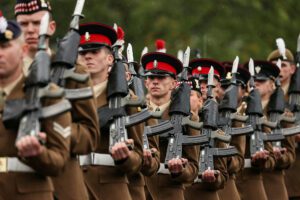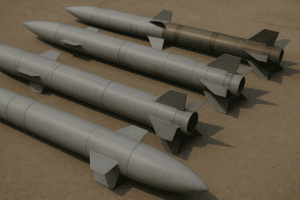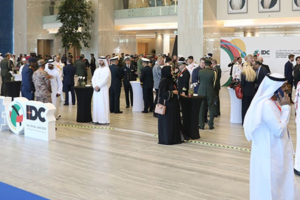The North Atlantic Treaty Organization is marking its role of 75 years of peace and how it will position itself for the future at the Washington summit next month, said Julianne Smith, the U.S. permanent representative to NATO.
Smith stressed the alliance’s resilience, agility and resolve in a wide-ranging discussion with the Defense Writers’ Group yesterday. She also looked at what NATO leaders will debate at the summit.
She said the 75-year mark for the alliance is a huge milestone. It grew out of the world’s experiences in World War II. The defensive alliance epitomized collective defense and originally was 12 countries poised to defend against the Soviet Union. It now encompasses 32 nations.
“It’s an important moment to reflect on everything that the alliance has been able to accomplish,” the ambassador said. “Reflecting on the alliance’s agility, its resilience, its relevance will all be things that we’ll want to take a minute and step back and also help our publics understand what the alliance of 2024 is.”
In 1949, the alliance was in place to stop Soviet tanks from rolling across Western Europe. It has changed as the circumstances changed. The alliance went through the erection of the Berlin Wall, the Prague Spring of 1968, the fall of the Iron Curtain in 1989 and the dissolution of the Soviet Union in 1992.
It shifted to missions in the Balkans in the 1990s and operations in Afghanistan following the attacks on the United States on Sept. 11, 2001. Now, it stands ready to defend every square inch of NATO territory in the face of Russian aggression against Ukraine.
” is still very much a military alliance, but it is also an alliance that is prepared to cope with new domains: cyberspace emerging and disruptive technologies, climate security, the list goes on and on,” she said.
In addition, NATO leaders will also look at burden sharing by alliance members, Smith said. After Russia illegally annexed the Ukrainian territory of Crimea in 2014, alliance leaders agreed to individually dedicate 2% of gross domestic product to defense spending. In 2014, only three nations — including the United States — hit that mark.
In 2024, possibly 23 NATO allies will hit or surpass that 2% mark. “It is a good news story in terms of the distance that the alliance has traveled on that aspect of burden sharing,” she said.
Burden sharing cuts both ways. “Sometimes I have the impression that folks on this side of the Atlantic believe that U.S. support to Ukraine is kind of a singular endeavor, that we are operating in a vacuum, and we are providing the support separate from the other 49 countries around the world that are providing security assistance to Ukraine,” the ambassador said. “So, we will want to take a minute at the summit and put a spotlight on burden sharing through another lens: not just the 2%, but also what Europe, Canada and the United States are doing together in Ukraine.”
Ukraine itself will be a focus of the summit. Ukrainian President Volodymyr Zelenskyy is planning to attend the gathering. She anticipates the NATO allies will put forward “a whole package of deliverables that will serve as a bridge” to Ukraine’s future membership in NATO.
“Part of the package will be the language we use to describe Ukraine’s membership aspirations,” she said. “Part of it will be working to identify new resources for our friends in Ukraine and ensuring that we send a signal to Moscow that the NATO alliance isn’t going anywhere.”
More than two years after the illegal and brutal invasion of a neighbor by Russian President Vladimir Putin, the NATO allies are standing firm against Putin, she said.
Smith also said she anticipates the NATO leaders will decide who will replace Secretary General Jens Stoltenberg.
Finally, the leaders will review how the alliance is “operationalizing” the new regional defense plans, she said. These plans mean a major shift across the alliance, most notably how allied countries invest, procure and work together to implement and execute those regional plans.
“It will be the better part of a 10-year project and will have a lasting impact on the deterrence and defense policies of the alliance, but it doesn’t get a lot of love and affection because there so many other things going on right now,” she said.
Media Contact
Editor, Defence Buyer
Tel: +44 (0) 1622 823 922
Email: editor@defencebuyer.com





